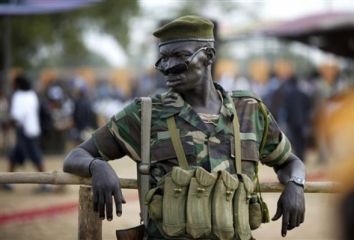South Sudan army denies new rebellions in Upper Nile and Ramciel
September 15, 2012 (RUMBEK) – South Sudan’s army on Saturday dismissed rebel claims that two groups of of disaffected soldiers have staged mutinies in Upper Nile State and in the Ramciel area of Lakes State, where the young nation intends to buld its new capita.

But since independence the SPLA has been confronted with various rebellions, initially in response to the 2010 elections, which were won overwhelmingly by the political wing of the former guerrilla movement the SPLM.
Between South Sudan’s self-determination in January 2011 and officially declaring independence in July a new rebellion began from Mayom County in Unity State, accusing the SPLM/A of tribalism and corruption.
The rebel South Sudan Liberation Army (SSLA) was launched in April led by senior SPLA figure, Peter Gadet. Gadet rejoined the SPLA in August that year but the rebellion continued under the leadership of James Gai Yoach and his deputy Bapiny Monytuil.
On Saturday Monyuil contacted Sudan Tribune to make various claims about about defections from the SPLA in Renk in Upper Nile and Ramciel in Lakes State. However, when contacted by Sudan Tribune the spokesperson of the SPLA, Colonel Phillip Aguer, denied that any such incidents had occured.
“This is not true. There is nothing like that”, Colonel Phillip Aguer, said without giving any further details.
The SSLA in their email claim that on 9 September a “Lt Col Deng Tito Lual Ajak rebelled with the force he was commanding at Chemedi near Renk town, Upper Nile State”. The rebels say that Ajak fought with the SPLA in the area and “started contacting SSLA on September, 10, and asked for cooperation”.
In his email Monytuil said that the “SSLA dispatched somebody to meet them around Renk to work out the modalities of cooperation”.
The SPLA spokesperson also denied that any rebellion had occurred in Ramciel, Lakes State, in response to the SSLA’s claim that on 13 September “a force of 3,000 led by a Major-General and a Brigadier rebelled and moved away. It is armed with tanks and anti-aircraft guns mounted on trucks”.
The SSLA statement said it was “working to start contact with the Maj. General who rebelled at Ramcie”, adding that his name “will be revealed when full contact is established”.
Aguer did not comment SSLA’s third claim that a boat carrying SPLA troops from Melut to Kodok in Upper Nile State was shot upon at the Lul checkpoint after it refused to stop at the previous posting on the river.
According to the SSLA, the SPLA force in Lul “shot at the boat and there was an exchange of fire. The boat was hit by an RPG rocket and capsized. There were 181 soldiers on board; 108 were killed and 73 managed to swim to shore.”
The incident and numbers involved could not be independently verified on Saturday but the SSLA claim that they are trying to contact the 73 SPLA soldiers that escaped.
Parts of this area of Upper Nile, where many people hail from the Shilluk ethnic group, are controlled by militia groups loyal to John Olony, who has led a rebellion against the SPLA since 2009.
Juba frequently accuses neighbouring Sudan of backing the rebellions in South Sudan in order to destabilise the new nation. Khartoum denies this and responds that the SPLA are continuing to back their former comrades in arms north of the border in South Kordofan and Blue Nile. South Sudan says it severed military ties with the SPLA North when South Sudan seceded last year.
The latest SPLA-N conflict with the Sudan Armed Forces (SAF) began when the military attempted to disarm group before key elements of the 2005 peace deal were implemented.
Security issues are one of the major sticking points in negotiations between the two nations being chaired by the African Union in Addis Ababa, Ethiopia.
(ST)
